The following firsthand accounts are real, raw and at times disturbing. They pull back the curtain on the everyday experiences of minorities in surgery and spotlight how various forms of discrimination manifest in ways both big and small. The brave providers who lent their voices to these pages want to raise awareness of systemic racism in health care and inspire a deeper understanding of how it impacts people of color who have dedicated their lives to caring for patients. They want to increase diversity, inclusion and acceptance in the profession they love. Their willingness to speak up inspires and shows that remaining silent about racial injustice is no longer an option. The conversation starts now. OSM
- Home
- The Magazine
- Article
Standing Together
By: Outpatient Surgery Editors
Published: 7/14/2020
Surgical professionals share their experiences of racism and express hope for a more inclusive future.
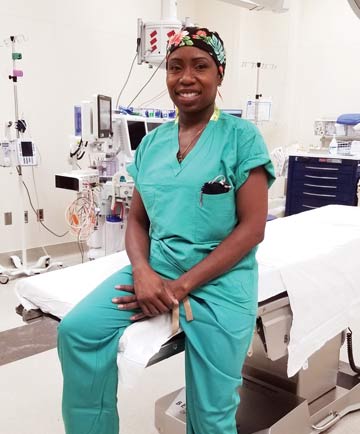
I'm fully aware of my blackness in a predominantly white work environment. Through-out my almost 20-year career in surgery, I've often been the only Black person in the OR. In most places I work, you can count on one hand the number of African Americans in the entire perioperative services environment.
I feel a constant pressure to not allow my true feelings to show, to suppress my emotions just to get through the day. I've felt that way for 18 years while working in surgery. That's my reality. It's exhausting.
I've faced racism numerous times during my career. A surgical retractor at a hospital I once worked at was nicknamed "Little Blackie" on preference cards because of its size and black coating. The staff didn't understand why I was offended, so I had to educate them about the name's derogatory connotation. To their credit, they immediately renamed the device.
I was a neurosurgery coordinator for 15 years at a pediatric hospital. During a holiday party attended by more than 100 guests, I was the only African American in the room. A woman approached and asked if I was one of the surgeon's secretaries.
"I've considered leaving this environment numerous times, but I keep showing up because patient care is my calling."
I once arrived at a new facility to train as a surgical assistant student. When I walked into an OR to help start a case, a nurse directed me to two rooms that needed to be cleaned. Her whole demeanor changed when the surgeon greeted me warmly and she realized I didn't work for environmental services.
At the end of a case, I asked a new nurse for the supplies I'd need to close the patient's incisions. A white scrub tech — who had been rather short with me during the entire procedure — told the nurse, "Don't talk to the help," which is a pejorative expression based on our race's history of servitude.
A scrub tech who I was precepting told me that she didn't want to work with an orthopedic surgeon as part of her rotation. When I asked her why, she said the surgeon made her feel uncomfortable and told me he had held up an instrument during a procedure and said, "This would make a good "n——- knocker.'" I was appalled and of course insulted, and reported the surgeon to the hospital's chief of surgery.
Most of these incidents have occurred within the last five years.
I'm defensive of my culture because of my own experiences. If you don't understand where I'm coming from, don't dismiss my pain or invalidate my feelings. I'm in a predominantly white work environment filled with people who can't relate to what I'm experiencing. I know the majority of my colleagues are good-natured, but some choose to be ignorant of the racism, both subtle and overt, that's present in health care.
I have numerous Caucasian friends and coworkers, and I don't believe their silence makes them racists. But it does hurt when they don't acknowledge derogatory behaviors going on around them, even as they claim to support me. You can't move on from something that continues to happen.
African Americans don't want to be limited on what we can achieve in life due to racism or biases projected onto us by others. We are so much more than the color of our skin, yet some people will never see us for who we are at our core. We've been through a great deal, yet we still have love and compassion for everyone because we know what it feels like to be hated and discriminated against.
I wear a surgical mask every day to do my job. What my colleagues don't see is the invisible mask I wear as a black woman in a predominantly white workplace to protect myself and make others comfortable with my presence. When do I get to remove that mask?
I've considered leaving this environment numerous times, but I keep showing up because patient care is my calling. Now I realize my purpose is to be a person of change. I want to work toward a more inclusive environment in the OR and create awareness about systemic racism in our field.
Bring the conversation of racism to the table even if it might be an uncomfortable conversation to have. Get comfortable with being uncomfortable because awareness is the first step of change. Be willing to discuss and deal with issues of race when they arise instead of dismissing them. Moving forward in the right direction is something in which we all have to be invested.
Ari Collins, SA-C/CST
Certified Surgical Assistant
Denver, Colo.
Keep Positive Conversations Going
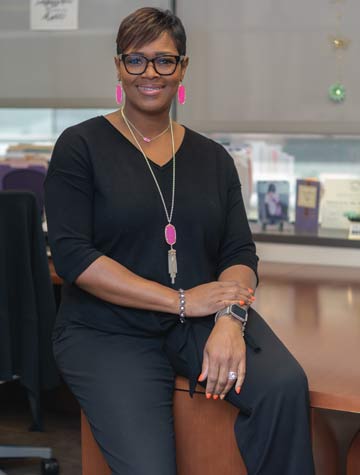
George Floyd's murder feels different. Everyone can imagine the horror of being unable to breathe for eight minutes and felt their heart ache as he desperately cried out for his mother. There's been a lot of anger, frustration and activism among people of all races and backgrounds over the past few months. It's an opportune time for people to express how they feel about discrimination, knowing their opinions and beliefs will be considered in a different way.
Systemic racism is ingrained in our culture. The Black Lives Matter movement isn't about African Americans deserving more than other people. We deserve the same things everyone else does while not being judged based solely on the color of our skin.
Throughout my surgical career, I've had to develop learned behaviors to ensure I have the opportunity to excel as a leader. I see the way some colleagues interact differently with me than they do with others. I've been intentionally left out of meetings or been withheld information that causes me to look bad among my peers. I've been excluded from planning and managing important projects that directly impact my department.
That's happened several times.
I've been conditioned to tone down some of my passion, so I'm not viewed as overbearing or refusing to fit in with my coworkers. It's impossible to truly explain how that feels to someone who doesn't live it. It's demoralizing and exhausting.
People who treat all races with dignity and respect are decent human beings, but that doesn't mean they stand up for minorities who face injustices or are willing to be a part of the change that needs to happen. Claiming you're not a racist is not the same as being against racism.
Silence is part of the problem. Some of my colleagues who don't know the right thing to say when they see discrimination in the workplace don't say anything at all. That's difficult to stomach as someone who faces some form of racism every day, who has to teach my children to act a certain way because of the color of their skin.
"Uncomfortable conversations are taking place that would not have been possible only a few months ago."
Many forms of racism have recently come to light for many people who've never understood the issues involved because they've never been discussed. I think we're at a place where individuals feel like they can say and do more. More people are listening, so it's important to speak up now. If you don't live it, you don't know it and you can't feel it. But if you know better, you do better. Bringing awareness to the issue will bring about needed change.
I'm hopeful. This is a unique moment in our history. People are no longer content to sit back and let things happen. Uncomfortable conversations are taking place that would not have been possible only a few months ago. It's time to talk about the need for more diversity and inclusion in surgery, and we need to keep those conversations going.
Nakeisha M. Archer, MBA, RN, NE-BC, CNOR, CSSM
Director of Perioperative Services
Texas Children's Pavilion for Women
Houston, Texas
Let's Work With, Not Against Each Other
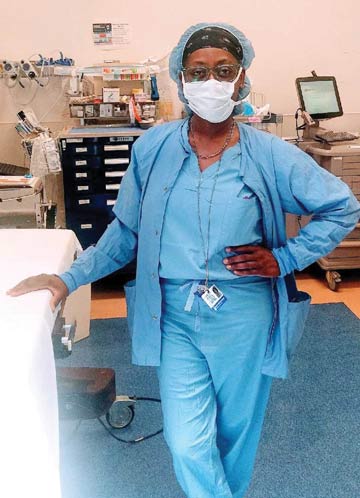
I was born in Haiti and came to America when I was 11 years old. I've always been interested in health care, which is why I became a surgical technologist 15 years ago. The job takes me to many different hospitals in different states.
I think discrimination takes place everywhere, even in the operating room. And while it's not always in your face, it is something you can see and feel. Some surgeons prefer to work with a certain race. They might not say so directly, but it's apparent because of their attitudes toward minorities. Some surgeons go out of their way to request management doesn't put a certain person in their room to assist during a procedure.
I've been doing this job a long time, and discrimination happens so often that it becomes part of your environment. I have become numb to it. If it's happening, you just brush it off. You can't change people, so you do what you can to get through the day.
Racism has no place in the operating room. To maintain my peace of mind, I go with the flow and don't say anything. I never let my personal feelings affect what I was hired to do.
Racism has recently come to the forefront of the nation's attention, so I think people have no choice but to pay attention. How long the focus lasts will depend on how long the government and institutions push the issue.
I think constant conversations about the social atmosphere in hospitals need to take place. If workplace environments do change, minorities would believe they have a better chance to move up and feel more confident. Oftentimes, we feel like we can't advance our careers because of the color of our skin.
Despite these challenges, I love my job. The best part of my day is having the opportunity to go to work and make a difference. We all must remember that our efforts must focus on patient care, not on our personal feelings and agendas. We are all a team and must act accordingly. Let's work with each other, not against one another.
Natalie Jupiter, CST
Traveling Surgical Technologist
Lopatcong Township, N.J.
Ready for the Start of a Bigger Movement
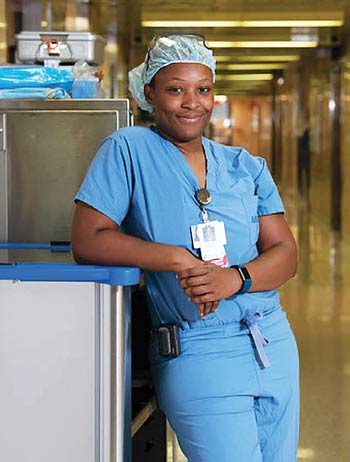
Since civil unrest after George Floyd's killing has spread across America, it hasn't been unusual to overhear my colleagues talking about how "thugs and animals are destroying our cities." Do I object every time I hear it? That depends on the day. I might if I got pulled over on the way to work for no reason or got handed a menu by a patient when I walked into their room because they assumed I was a member of the kitchen staff. Most days I ignore the comments or change the subject because I'm tired of trying to justify why African Americans are angry.
In addition to not always having the energy for those conversations, the fear of getting blackballed is always on my mind. I pick and choose my battles. Deciding how to walk that line is difficult. Despite my fears that sharing my thoughts here might harm my career, I feel like I have no choice but to speak out.
Patients who know me by last name only are often surprised I'm a short African American woman instead of a tall white man. I'm also told how articulate I am, even though I'm no more so than my white colleagues. My first name is Imani. It's pronounced phonetically and easy to say. Yet many colleagues have told me they're going to call me Elizabeth, my middle name, because it's easier to pronounce.
Some of these acts might not seem overtly racist to you, but they're microaggressions that make it incredibly difficult for a person of color to practice medicine. Dealing with subtle racism on a daily basis is exhausting. It's become a way of life for me and other minorities, and I don't think people realize how much stress it produces. Of course, overt acts of racism also happen. Patients have called me racial slurs or have asked to be seen by a different doctor after they meet me.
My experiences aren't unusual. I talk to other surgeons around the country who face the same prejudices. Physicians who are underrepresented and people of color talk about discrimination in surgery all the time. The only way to make progress on this issue is to put it on a bigger scale. Today's climate is an incredible opportunity for us to move forward.
Instead of simply applauding when small progress is made for racial equality and then moving on, we should confront the larger issues of how we got to this point. The good news is I've seen more of a willingness to do that recently. A critical mass is forming and momentum for change is happening. It's now easier for me to have uncomfortable, but necessary, conversations about race instead of staying quiet just to get through a day's worth of cases before going home.
Many Black Americans study African American history to learn about their past and take it upon themselves to learn about what wasn't taught in public schools. Everybody should make a concerted effort to learn more about this crucial part of America's history. Willful ignorance is our biggest hindrance to progress.
We still have a long way to go to achieve racial equity on hospital boards and representation in other top healthcare positions. My residency program, one of the oldest in the country, is 50% female. That's wonderful, but I'll only be the third Black female to graduate from it. That dearth of representation must change. I hope the new conversations occurring now are the start of a bigger movement.
Imani Elizabeth McElroy, MD
Resident Surgeon
Massachusetts General Hospital
Boston, Mass.
Responding to Racism During COVID-19
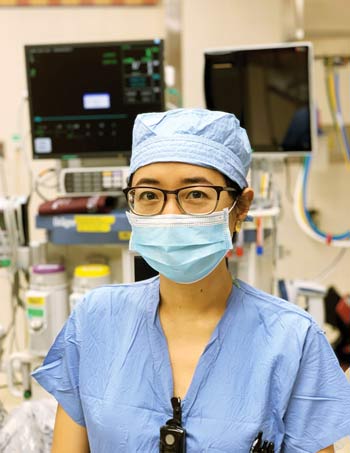
I grew up in Miami, the daughter of Chinese immigrants, and don't recall incidents related to my race as a child. I moved around a lot, so the worst thing I had to deal with was being the new kid at school. I went to medical school in New York and began my residency in 2017 at Massachusetts General Hospital in Boston. I can't remember anything happening to me before like what happened this March.
It was a regular day for me in the OR, just as everything was getting serious with COVID-19. We weren't testing every patient at the time, so I showered at work before heading home. It was really cold that day, and I put the hood up on my winter jacket because my hair was still wet. As I left the hospital and walked toward a subway station, I saw a man crossing the street in my direction.
I could hear him muttering, but I couldn't make out exactly what he was saying. As he got closer and spoke louder, it became clear: "Why are you Chinese people killing everyone? What is f—-ing wrong with you?" I started walking faster to get away. After harassing me for a block, he finally gave up and disappeared.
I ducked into a grocery store to call Mass General's police and security department. They quickly sent over an officer. She took my full report of the incident and asked if I wanted somebody to walk with me the rest of the way to the subway stop. I said I was fine.
I then texted my residency program director, who immediately called to check on me before notifying the chair of our department, who also called me. I also texted my residency classmates to let them know what happened. There are many Asians in our department, and I was worried my harasser was still lurking, or would soon return. The safety of my colleagues was my utmost worry.
Mass General's Vice President and Chief Equality and Inclusion Officer reached out and thoughtfully asked if he could refer to the incident in an all-staff email addressing racism during the pandemic (see "Racial Attack Prompts Widespread Support" on the opposite page). He also looped me into an all-staff virtual webinar that the hospital held on the topic.
Other incidents have occurred involving some of my colleagues of Asian descent. I've experienced microaggressions, like being called the same name as other Asian female colleagues. Someone at the hospital once called a friend of mine by another coresident's name. She corrected the person, who said, "Oh, you two look so alike."
"We need to publicize racially charged events every time they happen.—
Another fellow resident said she was on the subway when a stranger started yelling at her with vile accusations similar to what I experienced during my attack. She was thankfully with friends. Other people on the train also pulled out their phones to capture video of the incident and said, "Don't worry, we'll protect you."
We need to publicize racially charged incidents every time they happen. How else will people see what's going on? How else will we talk about the problems and find solutions? It's incredibly important to discuss the problem of racism in health care.
I think we've reached a tipping point. If you look at the data being cited, a higher percentage of people than ever support Black Lives Matter. The movement, and what people are fighting for, applies to everyone. Activism against racism shouldn't be separated by minority racial differences. Everyone should be in this together.
Lucy Li, MD
Resident Anesthesiologist
Massachusetts General Hospital
Boston, Mass.
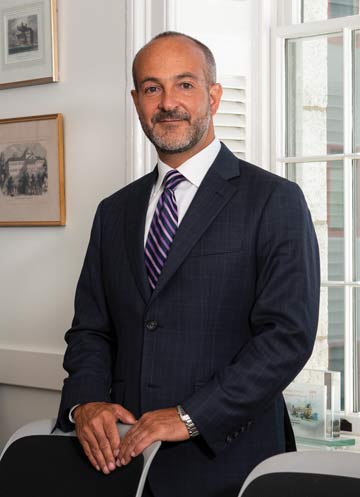
Why do you need to worry about structural racism in surgery? It's a fair question, especially if you've never faced or had to deal with overt prejudice or racial bigotry. I challenge you to step back and accept that all institutions, including health care, are built on policies and practices that exclude certain people. If you've never been on the receiving end of racism, you aren't going to see it — at least not as clearly as someone who has.
I think Presidential Medal of Freedom recipient and NBA all-time leading scorer Kareem Abdul-Jabbar may have explained it best in a recent Los Angeles Times op-ed when he compared structural racism to dust in the air: "It seems invisible — even if you're choking on it — until you let the sun in. Then you see it's everywhere. As long as we keep shining that light, we have a chance of cleaning it wherever it lands."
Our organization has created an environment where people like Lucy Li, MD, whose story begins on the previous page, feel empowered and safe to report instances of racism. After Dr. Li was harassed on her way home from work, we sent an email blast to the 78,000 employees of our health system to inform them of the incident and tell them what they should do if they witness or face similar forms of harassment. We also hosted an organization-wide webinar about xenophobia in the U.S. as a direct result of COVID-19. Dr. Li participated as a speaker and talked about her experience.
Healthcare leaders have a golden opportunity to shine a light on problems in our system. Of course, change is never easy, particularly when it involves overhauling a long-standing, complex system. The best place to start is with data, which shows minorities are significantly underrepresented in healthcare professions. For example, a 2018 report from the Association of American Medical Colleges says 56.2% of active physicians identified as White, 17% identified as Asian, 5.8% identified as Hispanic and 5% identified as African American.
Your first impulse might be to explain away that underrepresentation, but a deeper dive into the numbers, the history of health care and portals of entry into the system for all individuals will likely offer contributing factors that you weren't aware of or never considered.
When data uncovers a potential issue, don't fall into the trap of framing it as "good" or "bad." If you can analyze issues of race with an open mind, an honest discussion emerges around subconscious bias, implicit bias and stereotyping, things we're all guilty of on some level. We tend to default to these biases when we're in a high-pressure, stress-filled environment — the literal description of a fast-paced OR.
To combat deep-rooted, system-based stereotypes, you have to do a deeper dive into what's lurking below the surface. Only after you analyze ways in which structural racism impacts health care can you correct actual or potential issues.
Make sure your values regarding diversity and inclusion are known throughout your entire organization. You need to clearly articulate what behaviors won't be accepted and make sure everyone feels comfortable reporting race-related issues that may arise.
Investing in diversity and working to remove biases and structurally racist systems, which might exist in your facility without you being aware, is beneficial on many levels. The research tells us that we solve problems better, get more out of employees and are able to excel on an organizational level when everyone feels valued and engaged. Leveraging individuals with different lived and learned experiences makes us better in everything we do.
Joseph Betancourt, MD, MPH
Vice President and Chief Equity and Inclusion Officer
Massachusetts General Hospital
Boston, Mass.
.svg?sfvrsn=be606e78_3)
.svg?sfvrsn=56b2f850_5)